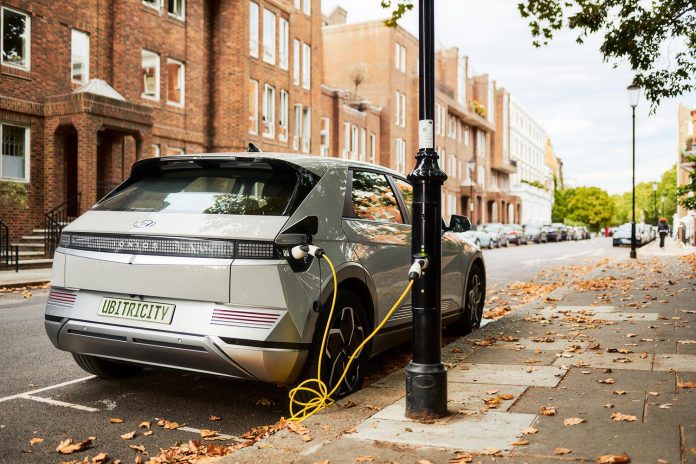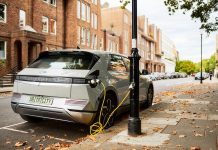Here Shell Fleet Solutions discuss how ubitricity is working with Liverpool City Council to help Liverpool expand its public charging network to become the north of England’s most EV-friendly city
In the UK, road transport is the most significant contributor to greenhouse gas (GHG) emissions, making up nearly a quarter (24%) of total emissions. (1)
The Government has outlined measures to decarbonise the transport sector, banning the sale of petrol and diesel vehicles by 2030, with all new cars and vans being fully zero emission by 2035. (2)
Those targets can only be met if businesses and drivers alike are confident that they can reliably transition to EVs, by having the right infrastructure in place to support adoption. Scaling EV infrastructure cannot be achieved alone; it requires collaboration between businesses, industry, and Government.
Governmental support driving EV adoption
The Government has already taken measures to drive EV adoption, targeting the installation of around 300,000 public EV chargers, by 2030.
Shell is also joining this effort, with plans to have 100,000 chargers, 11,000 of which will be rapid chargers, in public locations such as charging hubs, forecourts, and supermarkets by 2030. The aim is that 90% of UK drivers will be within a 10-minute drive of a Shell rapid charger.
Equally, the proliferation of public charging will only be possible with investment to support it.
Earlier this year, the UK Government announced £56 million of funding to expand the Local Electric Vehicle Infrastructure (LEVI) grant and boost the existing On-Street Residential Chargepoint Scheme (ORCS), contributing to the deployment of 2,400 charge points. (3)
One city is currently at the forefront of the transition. Soon, Liverpool City Council will have one of the North of England’s largest EV networks, more than quadrupling their capacity by installing 300 on-street EV charge points.
This expansion was made possible thanks to Government ORCS funding and working with ubitricity, a subsidiary of Shell, to deliver the extensive rollout.
Leading the charge for an EV-friendly city
In 2019, Liverpool City Council declared a climate emergency, laying out a roadmap to address the city’s carbon footprint, culminating in an ambitious target of becoming net zero by 2030 – two decades ahead of the UK’s broader 2050 timeline.
To reach that goal, the city would need to decarbonise its transport, which was identified as the second largest contributor to emissions – most of which was attributed to road traffic. (4) Encouraging widespread EV adoption plays a crucial role in the city’s journey to net zero.
However, one of the major barriers to EV adoption is access to public charge points, particularly in cities like Liverpool, where many residents do not have access to off-street parking.
In Liverpool, over ten requests for new public charging points are received each week, as most EV motorists rely on on-street parking. (5)
Deploying more public charge points requires significant planning. It took Liverpool City Council around 9 to 12 months to secure stakeholder alignment and ORCS funding before any installations could be made.
Once the correct funding was in place, Liverpool City Council began working with ubitricity – who are listed suppliers across ESPO, CCS, YPO, Oxford EV DPS, and Hydrogen Dynamic Purchasing Scheme frameworks – to support the planning and installation of the charge points, to areas that needed them the most.
On the road to greener transport
Taking a community-led approach when deploying the charge points was essential. To support the needs of existing EV drivers, and encourage EV adoption across ICE motorists, the on-street charge points had to be conveniently placed and readily accessible.
ubitricity consulted with residents throughout the process, to negate any concerns about where charge points were going to be placed and conducting surveys to determine where demand for new charge points was highest.
After this public consultation, Liverpool City Council and ubitricity worked to install the charge points directly into existing street lampposts, taking just 2 hours to install each charge point.
Within the first three months of 2023, Liverpool City Council and ubitricity had installed 200 chargers, each with a charging speed of up to 5kWs. This means, using the newly installed chargers, residents can fully charge their vehicles overnight – as they would with a home charger – in around 8 hours. (6)
The new on-street chargers are managed via the Shell Recharge App, making it easier for residents to plan and manage charging. In addition to this expanded on-street charging network, the Shell Recharge App offers residents access and visibility to Shell’s entire network of more than 400 public charge points across the Liverpool City Region. (7)
Equally, this improved network also supports Liverpool City Council’s own electrification journey as they begin converting their corporate fleets to EVs, beginning with their highway inspectors’ vehicles later this year.
The impact of creating an EV-friendly city
The impact of Liverpool City Council and ubitricity’s work to expand public charging has not only helped to accelerate the EV transition amongst its residents but has contributed to the city’s wider decarbonisation goals.
Liverpool City Council will no longer have to consider introducing a Low- Emission Zone in the city centre, as they are on track to meet their emissions targets without it.
Yet, this significant progress was only made possible through collaboration. Consultancy between Liverpool City Council and ubitricity, and then the residents themselves, played a critical role in determining how best to approach the installations to ensure that the charge points were deployed where they would be used and benefitted from the most.
Liverpool City Council’s work of ubitricity highlights one way Shell can support customers with the transition to EVs. Shell Fleet Solutions offers a range of home, office, depot and on-the-go charging solutions to support fleets at every stage of their journey and help support an ev-friendly city.
Learn how Shell and ubitricity could help you to accelerate your EV transition: www.shell.co.uk/fleets
References
- Gov.uk, Transport and environment statistics
- Gov.uk, Outcome and response to ending the sale of new petrol, diesel and hybrid cars and vans
- Gov.uk, £56 million of public and industry funding electrifies chargepoint plans across the country
- Liverpool Net Zero Carbon 2030: The climate challenge.
- https://ubitricity.com/en/press-releases/ubitricity-300-charge-points-liverpool/
- Based on a 50kW battery and the vehicle having 20% charge.
- Shell Internal Data.
Shell Fleet Solutions
+44 (0)800 140 4959
shell.co.uk/a2z
Find us on LinkedIn
More About Stakeholder
-
Shell Fleet Solutions
Shell Fleet Solutions help businesses to drive their fleets to net-zero emissions with the Accelerate to Zero programme.





























